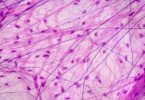Immune system test questions:
Blood vessels near a wound dilate and become more permeable in response to which material released from damaged cells ?
(a) Pyrogens
(b) Antibodies
(c) Histamine
(d) Interferons
Related: Laws of motion Quiz
Disease causing damage of the membrane of the brain is
(a) Meningitis
(b) Pertussis
(c) Diptheria
(d) Trachoma
Find the odd one out
(a) Typhus fever
(b) Trench fever
(c) Yellow fever
(d) Q fever
Cellular immunity is provided by
(a) B lymphocytes
(b) Histiocytes
(c) T lymphocytes
(d) Monocytes
Related: Haloalkanes and Haloarenes questions
Which of the following is not an autoimmune disease?
(a) Lupus erythematosus
(b) Erythroblastosis foetalis
(c) Glomerulonephritis
(d) Rheumatoid arthritis
In a new born baby, thymus is removed, this will lead to failure of production of
(a) T-lymphocytes
(b) Monocytes
(c) B-lymphocytes
(d) None of these
Allergic rhinitis is another name for
(a) Tetanus
(b) Typhoid
(c) Hay Fever
(d) Yellow fever
Which of the following set comprises of all viral infections
(a) Chicken pox, Poliomyelitis, Rabies, Pneumonia
(b) Measles, Mumps, Yellow fever, AIDS
(c) Dengue fever, Malaria, Syphilis, Influenza
(d) Tetanus, Diptheria, Rabies, Chickenpox
Related: Biotechnology Quiz
Glossina palpalis is a vector for
(a) Dengue fever
(b) Filariasis
(c) Gambian fever
(d) Bubonic plague
Concave lenses are used to correct
(a) Myopia
(b) Hyperopia
(c) Hypermetropia
(d) Cataract
Inflammatory response is indicated by
(a) Redness at the place of infection
(b) Dilation of the blood vessels and their increased permeability
(c) Release of histamine and pyrogens accompanied by mild fever
(d) All of these
Related: Biology MCQ test
Accumulation of excess fluid in tissue spaces is
(a) Oedema
(b) Cirhosis
(c) Parkinson’s disease
(d) Hodgkin’s disease
Rejection of transplanted organ is due to
(a) B-cell
(b) Esinophils
(c) T-cells
(d) Neutrophils
Removal of spleen from the body of an adult man will result in the failure of
(a) Filtration of dead erythrocytes
(b) Production of WBCs
(c) Production of RBCs
(d) Immunity
Antigens are found
(a) Inside cytoplasm
(b) Inside nucleus
(c) On nuclear envelope
(d) On cell surface
Related: General organic chemistry questions
The fever producing substance is
(a) Pyrogens
(b) Toxins
(c) Both (a) and (b)
(d) Bursal tissues
Study of interaction of antigen and antibody in blood is
(a) Haematology
(b) Serology
(c) Cryobiology
(d) Angiology
Bacteria are killed by lysozymes with the destruction of
(a) Mitochondria
(b) Cell wall
(c) Nucleic acid
(d) Lipid bilayer
Immunodeficiency can result from which of the following ?
(a) Gene mutation
(b) Infection
(c) Malnutrition
(d) All the above
Related: Respiratory system multiple choice questions and answers
Which of the following is not involved in elicitation of immune system ?
(a) Thymus
(b) Brain
(c) Spleen
(d) Lymphnodes
Which of the following is not a component of innate immunity ?
(a) Antibodies
(b) Interferon
(c) Complement proteins
(d) Phagocytes
The drug which prolongs the life of many AIDS patients is
(a) Zodovudine
(b) Zidovudine
(c) Aspirin
(d) Cyclosporin
Vaccines produced through genetic engineering are safe as
(a) They contain antigen only from coat of pathogen
(b) They are least active form virus
(c) They are attenuated form of pathogen
(d) All the above
Related: Electrostatics MCQ
The disease caused due to abnormal pressure on regions of the brain
(a) Hay fever
(b) Ulcers
(c) Tumours
(d) Epilepsy
Which is not a water-borne disease?
(a) Typhoid
(b) Cholera
(c) Asthma
(d) Amoebiasis
Antibodies are isolated from immune:
(a) Serum
(b) Plasma
(c) Blood
(d) Vitamins
The rejection of organ transplanting in humans is prevented by using:
(a) Aspirin
(b) Thrombin
(c) Calcitonin
(d) Cyclosporine
Related: Plant Kingdom Questions
An antibody is a
(a) Component of blood
(b) Secretion of mammalian erythrocyte
(c) Molecule that specifically inactivates an antigen
(d) White corpuscle which attack invading bacteria
Which one of the diseases is due to an allergic reaction ?
(a) Goitre
(b) Skin cancer
(c) Hay fever
(d) Enteric fever
What is released in body during disease which results in fever ?
(a) Pyrogens
(b) Antibodies
(c) Interferons
(d) Interleukins
Which of the following is used to make vaccines?
(a) Activated pathogen
(b) Attenuated pathogen
(c) Pathogen blocked by antibody
(d) None of the above
Related: MCQ on Gravitation
Typhoid fever is caused by
(a) Yersinia
(b) Salmonella
(c) Treponema
(d) Streptococcus
Cholera is caused by
(a) Virus
(b) Fungi
(c) Bacteria
(d) Protozoan
Hansen’s disease is another name for
(a) Lerprosy
(b) Tetanus
(c) Plague
(d) None of the above
Syphils is a sexually transmitted disease caused by
(a) Vibrio
(b) Pasteurella
(c) Corynebacteria
(d) Treponema
Which of the following is a bacterial disease ?
(a) Polio
(b) Leprosy
(c) AIDS
(d) Ascariasis
In polio, the legs get paralyzed and atrophied due to
(a) Obstruction of muscles
(b) Death of some muscles
(c) Degeneration of bones
(d) Shrinkage of muscles
Common cold is caused by
(a) Virus
(b) Bacteria
(c) Fungi
(d) Protozoa
Which pair of diseases is viral ?
(a) Cholera and TB
(b) AIDS and Syphilis
(c) Mumps and Rabies
(d) Tetanus and Typhoid
Related: MCQs on Physical world and measurement
Jaundice is disease of
(a) Kidney
(b) Duodenum
(c) Liver
(d) Pancreas
Black water fever is caused by
(a) Plasmodium vivax
(b) P. malariae
(c) P. ovale
(d) P. falciparum
AIDS was first discovered in
(a) 1981 in America
(b) 1981 in Panama
(c) 1984 in Mexico
(d) 1984 in France
Related: Chemistry kinetics test
Radiotherapy is used for
(a) Detecting bone fracture
(b) Detecting cardiac trouble
(c) Getting whole body’s photograph
(d) Treating cancer by controlled exposure of X-rays
Which of the following is sexually transmitted disorder ?
(a) Hepatitis E
(b) Hepatitis B
(c) Hepatitis C
(d) Hepatitis D






